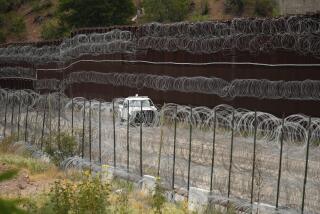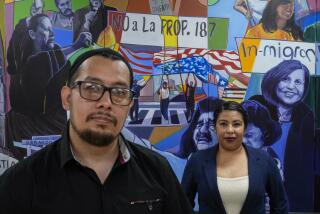Bush Signs Law Boosting Immigration Quotas by 40% : Legislation: President hails the act, which attempts to lure those with job skills. Provisions also will allow many to join families already in the U.S.
WASHINGTON — President Bush Thursday signed into law the most sweeping revision of the nation’s immigration laws in 66 years, hailing provisions that would admit those with needed job skills, reunite immigrant families and speed deportation of alien criminals.
In addition to boosting immigration quotas by 40% beginning in 1992, the Immigration Act of 1990 cuts back on provisions under which aliens have been denied entry in the past on grounds of ideology or sexual orientation and gives temporary protection to Salvadoran immigrants.
“This act recognizes the fundamental importance and historic contributions of immigrants to our country,” Bush said at a White House signing ceremony. He said that the new law “is good for families, good for business, good for crime fighting and good for America.”
Atty. Gen. Dick Thornburgh declared that the new law “encourages the immigration of exceptionally talented people such as scientists, engineers and educators, while maintaining and enhancing this nation’s historic commitment to family reunification.”
Despite the praise from Administration leaders, however, advocates of immigrant rights in Southern California contended that the new law does not do enough for those from Mexico, other Latin American countries and the Pacific Rim.
“It’s a bone with very little meat on it,” said Cesar Noriega-Pena, directing attorney for One Stop Immigation & Educational Center in Boyle Heights.
He and others maintained that the law, while attempting to attract more professionals to the United States, does nothing to reduce the 10- to 15-year waits that some families from Mexico endure before being reunited with relatives in this country.
The White House disputed this, noting that family-based immigration is increased in all major categories under the new law. The total immigration level of 700,000 a year for 1992-1994 includes 520,000 family-sponsored aliens. The law also includes a special allocation of 55,000 visas a year for spouses and minor children of formerly illegal aliens granted amnesty in 1986, the White House said.
While hailing major elements of the new law, John J. Curtin Jr., president of the American Bar Assn., said that he is “disturbed” by provisions that may impede the ability of people involved in immigration proceedings to obtain legal representation and that could exclude genuine applicants for political asylum.
“We hope that we can work with the Administration and Congress to modify these troublesome provisions early next year,” Curtin said.
Major features of the new law will:
--Raise total annual immigration levels from 540,000 to 700,000 in 1992-94, then drop them to a minimum of 675,000.
--Besides more than doubling employment-based immigration for mostly highly skilled workers, set aside 10,000 employment visas for those who invest at least $1 million in a new enterprise in the United State that employs 10 or more workers.
--Swiftly deport aliens who have committed violent or drug-related crimes--offenders who currently account for nearly one quarter of the federal prison population.
--Clarify the authority of Immigration and Naturalization Service enforcement officers to make arrests and carry firearms.
--Increase the size of the Border Patrol and create new civil penalties for those involved who deal in fraudulent immigration documents.
--Refine provisions of the 1986 Immigration Reform and Control Act to deter discrimination resulting from sanctions against employers of illegal aliens.
--Provide temporary protected status to certain categories of foreign nationals facing dangerous circumstances in their homeland, specifically singling out those from El Salvador.
Representatives of Central American refugee groups criticized the temporary nature of the protection, noting that the Salvadorans will face deportation proceedings in July, 1992.
“It took the U.S. government seven years to recognize that there are problems in El Salvador,” said Madeline Janis, executive director of the Centeral American Refugee Center of Los Angeles, “But we’re always urging a lot of caution because the specter of deportation is always there.”
Times staff writer George Ramos in Los Angeles contributed to this story.
More to Read
Get the L.A. Times Politics newsletter
Deeply reported insights into legislation, politics and policy from Sacramento, Washington and beyond. In your inbox three times per week.
You may occasionally receive promotional content from the Los Angeles Times.










